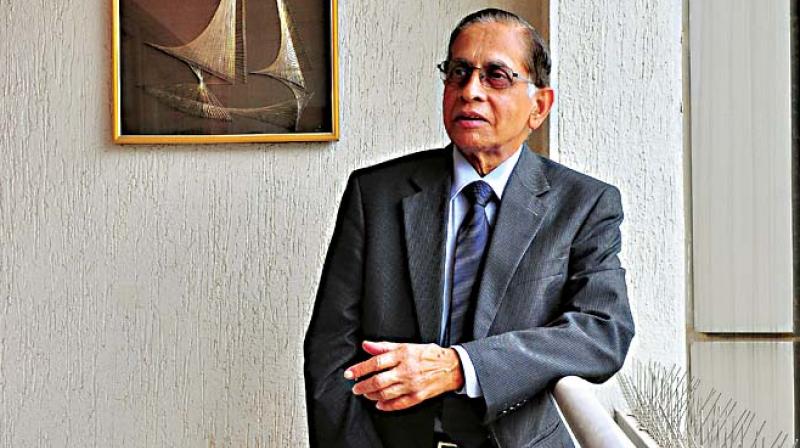Healing touch: Free medical care for the rural poor

Dr P. Mohan Rao, who had earlier served as director of medical services at HAL, belongs to the old school which believed in maintaining a good rapport with the patients and upholding high standards of medical ethics. While in service he used to serve the poor for free and continued it even after his retirement. He was instrumental in setting up MVJ College and Hospital in Hoskote in 2001 and now it caters to 500 villages. Dr Rao was recently honoured with the Rajyotsava award.
Aksheev Thakur reports
He laments that the relationship that once existed between doctors and patients has taken a backseat and the concept of the family physician is now almost extinct. “Even for a cough today a patient seeks out a specialist. Earlier doctors had a personal rapport with their patients. This relationship must resume,” says Dr P Mohan Rao, a noted cardiologist of the city.
But then he belongs to the old school of doctors, having served as the Chief of Medical Services at Hindustan Aeronautics Limited (HAL) until his retirement in 1998. He notes that even medical courses today concentrate more on diagnosis and treatment and lay little emphasis on medical ethics. Not only is Dr Rao old school in his views, but also believes strongly in practicing meaningful medicine, helping the poor and needy.
Even while he was with the HAL, his work took him to its adopted village, Kagadassa pura. “Our doctors visited the village and treated the poor for free. An orphanage with 120 children was adopted too and this went on till I retired,” he recalls.
His zeal to serve the poor continued even after his retirement and he accepted the offer of the Venkatesha Education Society to start a hospital and medical college in a rural area.
In 2001, the MVJ College and Hospital was commissioned in Hoskote and today caters to 500 villages. Besides the routine check-ups that are free, the hospital provides free breakfast to the inpatients.
“I saw this as an opportunity to serve the villages of our country. As our aim was to serve the needy we did not have special wards as their patients would have received more attention from the nurses than those in the general ward. Also, the special check-ups like MRI are done at one-fourth of the market price,” says Dr Rao.
Since 2001, the hospital has treated 49 lakh outpatients, 4.5 lakh inpatients, and carried out 1.2 lakh surgeries besides organising screening camps around Hoskote that have successfully treated over 75,000 patients .
Dr Rao reveals that diabetes and hypertension are two of the biggest killers in rural areas. “We screened villages and found that seven to eight per cent of the people with diabetes and hypertension had no idea they had them. If they are detected early then heart and kidney damage can be avoided. The biggest challenge here is creating awareness,” he explains.
One of his great inspirations has been his father who served as a doctor in World War II. “Like father like son, my mother always said and this steered me towards medicine,” he acknowledges.
He was also motivated by what spiritual guru, the late Sri Sathya Sai Baba once said at a World Cardiology Meet where Dr Rao got to be his interpreter. “Baba said that the hands that treat the poor are a thousand times better than the lips that pray. This inspired me to take up social work,” Dr Rao reminisces.
Deploring the soaring medical costs that have put treatment out of the reach of a large section of the population today, he says the only solution lies in laying more emphasis on prevention of diseases.
Blaming the commercialisation of medical care partly on the steep rise in the cost of medical courses, he says it has an impact on the psyche of young medical graduates, who then want to start making money, putting the concerns of rural India on the backburner.
“But then medical colleges too do not have great funding from the government and right from purchase of land to setting up a hospital, everything is costly,” he observes. While acknowledging the practical difficulties that colleges face today, he believes it is also important to teach medical students the joys of giving back to society and serving the poor.
Considering his years of work in the field of medicine and his genuine concern for society, Dr Rao was awarded the Kannada Rajyotsava award in November. But to doctors of his ilk the reward clearly lies in the joys of the profession itself, helping and treating people, especially those who are most in need in the villages of India.

